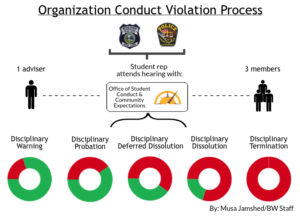 Editor’s Note: An earlier version of this piece incorrectly stated that the Phi Kappa Theta and Delta Chi fraternities were sanctioned for alcohol-related incidents in September and that Phi Kappa Theta was given a disciplinary warning. The fraternities were placed on temporary suspension pending the outcome of their conduct cases. Additionally, a paraphrased quote from Holly Taylor, assistant director of the Office of Student Conduct and Community Expectations, was corrected.
Editor’s Note: An earlier version of this piece incorrectly stated that the Phi Kappa Theta and Delta Chi fraternities were sanctioned for alcohol-related incidents in September and that Phi Kappa Theta was given a disciplinary warning. The fraternities were placed on temporary suspension pending the outcome of their conduct cases. Additionally, a paraphrased quote from Holly Taylor, assistant director of the Office of Student Conduct and Community Expectations, was corrected.
—
Earlier this month, the Phi Kappa Theta and Delta Chi fraternities were placed on temporary suspension pending the outcome of conduct cases. In order to evaluate these incidents, the university held conduct meetings to determine the appropriate course of action.
When a sorority or fraternity violates the rules of conduct at Lehigh, administrative officials meet to discuss possible consequences. However, some Lehigh students have questioned what these conduct meetings entail and who exactly is allowed to participate in them.
Holly Taylor, the assistant director of the Office of Student Conduct and Community Expectations, said in initial meetings when the details of an incident are discussed, no witnesses are allowed to sit in. After the investigation, however, the organization in question may bring a witness to the hearing.
“After an investigation, if an organization is charged with violations of code, they are permitted to bring witnesses to their hearing,” she said. “If they have a witness who cannot attend the hearing, they may submit a statement from that person.”
Interfraternity Council president Bryce Maccomber said the council is not involved in the Office of Student Conduct and Community Expectations or the conduct process so it cannot comment on the meetings. The Panhellenic Council was unable to comment.
Fraternities and sororities are often at the forefront of conduct violation discussion. However, Taylor said, other organizations on campus can be penalized as well.
“Just like any case, the conduct process begins with the Office of Student Conduct receiving a report from Bethlehem Police Department, Lehigh Police Department or other university community members,” she said.
All organizations, including sports teams, are held to the same Lehigh Student Code of Conduct and can be penalized and forced to attend to a conduct meeting or hearing if it is suspected they have violated conduct.
Michael Schwab, co-captain of the Student Athlete Council, said student athletes are held to a high standard at Lehigh, just like every other student at the university.
“There could be disciplinary actions from coaches, there could be disciplinary actions from the top all the way down,” Schwab said. “A lot of it depends on what the actual violation against the code of conduct is.”
Schwab said student athletes are especially aware of their high visibility on campus and how their actions are publicized.
The different levels of charges that can be levied against organizations can be found in Article VII, Section IV, of the Lehigh Student Code of Conduct.
There are five primary sanctions and several secondary sanctions that can be imposed on organizations.
Charges range in severity, with the least severe sanction being a “disciplinary warning,” which according to the Code of Conduct is “a written statement of the responsibility of a group or organization for a violation.”
The most severe sanction, “disciplinary termination,” is “the permanent loss of University recognition.” In this case, the organization cannot represent Lehigh in any capacity or use the university’s equipment or facilities.
Either Taylor or Chris Mulvihill, the interim associate dean of Student Conduct and Community Expectations, run the meeting each time.
However, student representatives of the organization in question are allowed to bring specific Lehigh officials.
Athletes can bring their coaches, Greek chapters can bring alumni advisers and other organizations can bring any Lehigh official or university friend they would like.
“Students are allowed to have a university friend with them to serve in an advisory role and can have three additional members of their organization sit in the hearing to observe,” Taylor said.
Typically, the captain of a sports team or president of a fraternity or sorority will represent their organization in a conduct hearing, but since they are allowed to bring university friends and officials along with them, this offers another angle of transparency and promotes fairness.
“As the Student Athlete Council, our mission is advocating for student athletes’ wellness and well-being (across) all platforms, especially in the social setting,” said Hailey Pascoe, a member of the Student Athlete Council.
Ashley Baudouin, the assistant dean and director of Fraternity and Sorority Affairs, said most student questions can be answered by reviewing the Code of Conduct.





Comment policy
Comments posted to The Brown and White website are reviewed by a moderator before being approved. Incendiary speech or harassing language, including comments targeted at individuals, may be deemed unacceptable and not published. Spam and other soliciting will also be declined.
The Brown and White also reserves the right to not publish entirely anonymous comments.
1 Comment
Lehigh has turned into a kangaroo court meant to appease weak conformist minds. So happy i dont go here anymore. It must really feel great for administrators to damage kid’s lives.